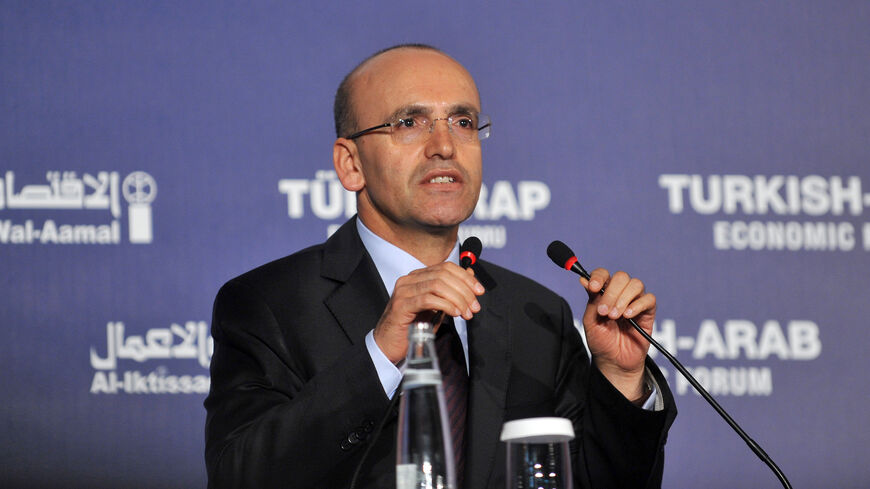ANKARA — Turkish President Recep Tayyip Erdogan on Saturday likely signaled a shift toward more conventional economic policies, as finance veteran Mehmet Simsek, who enjoys international credibility, is set to return at the helm of Turkey’s embattled economy.
Turkey’s newly inaugurated President Erdogan unveiled his 18-position Cabinet on Saturday, naming Simsek, former finance minister and deputy premier, as his new treasury and finance minister. The move signals a major U-turn on the part of Erdogan, whose long-held unconventional economic view relies on higher interest rates cause higher inflation. Still, Simsek, who is known as the champion of economic orthodoxy, will face an uphill battle to salvage the country’s beleaguered economy even under conventional economic policies.
After assuming sweeping powers under his executive presidential system, Erdogan made a fresh push to put his unorthodox economic policy into action. Conflicts stemming from the implementation of his controversial policy led to the discard of three finance ministers and central bank governors within a span of nearly four years. Heeding political pressure from Erdogan, the country's central bank slashed interest rates to as low as 12% in 2019 before they were re-hiked to as high as to 17% in 2020. The rates then were brought down again to as low as 8.5% over the past two years at the expense of economic growth.
Critics say the bank's independence largely eroded under Erdogan’s executive presidency system, accusing the government of depleting the central bank’s forex reserves by channeling hard currency to the market through backdoor mechanisms in a bid to rein in the devaluation of the Turkish lira in the face of lower interest rates.
Simsek's return to politics likely aims to send a message of stability to the markets, signaling the end of major zigzags in Turkey's monetary policy over the past years.
In contrast with the current landscape, Simsek’s tenure as finance minister between 2009-2015 and as deputy prime minister responsible for the economy from 2015-2018 was marked by relative stability. Simsek repeatedly stressed the importance of the independence of the central bank as an economic player during his years in office.
Soft-spoken Simsek, 56, who enjoys international and domestic credibility, built himself a reputation among domestic and international finance corners as an honest and rational politician. Before his debut in politics under Erdogan’s ruling Justice and Development Party (AKP), British-educated Simsek was the head of Fixed Income Strategy and Macro Economic Research for the Europe, Middle East and Africa region at Merrill Lynch in London. His career in finance kicked off as a Wall Street strategist.
Simsek didn’t assume any position under Erdogan’s government formed in late 2018 under the presidential system, which gave Erdogan sweeping authority. His deputy premiership saw internal discord within the government over Erdogan’s unconventional views, prompting him to attempt to resign in early 2018. His resignation was reportedly fended off by the mediation of then-Prime Minister Binali Yildirim.
The rift between Erdogan and Simsek became glaring after the economy czar left active politics. In a 2019 address, Erdogan publicly accused Simsek of malfeasance regarding a legal transactions.
It remains to be seen how Simsek and Erdogan will reconcile their structural differences over monetary policies, but the incoming treasury and finance minister reportedly asked for autonomy in the management of the economy in a series of meetings he held with Erdogan before and after the elections.
Still, the minister faces an uphill battle to combat inflation, curb soaring prices and win foreign investors’ confidence.
The Turkish Central Bank's net foreign reserves have fallen below zero for the first time since 2002, according to official data released in late May. Coming atop breakneck inflation and an acute cost of living crisis, Turkey’s risk premium has also shot up, exceeding 600 basis points.
The Feb. 6 earthquakes that killed more than 50,500 people in southern Turkey further exacerbated the country’s financial woes, as has the spending spree Erdogan embarked on ahead of the May 14 general elections by announcing a series of wage hikes and incentives.
Fidan as foreign minister
Besides Simsek’s appointment, Erdogan also named spymaster and confidant Hakan Fidan as foreign minister. Fidan, 55 years old, has been Turkey’s intelligence chief since 2010. In that capacity, he built strong ties with many foreign governments including the US, Russia, and Iran.








